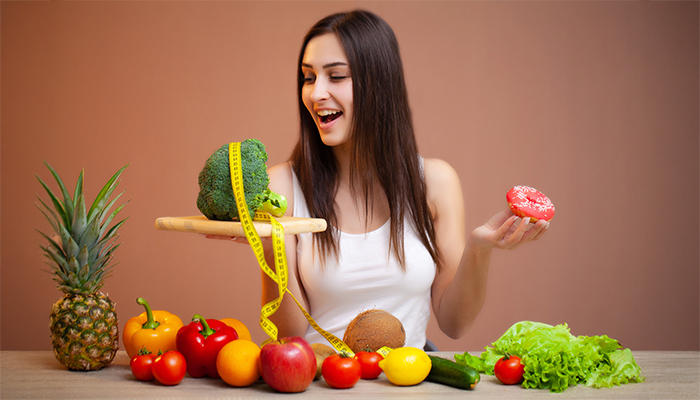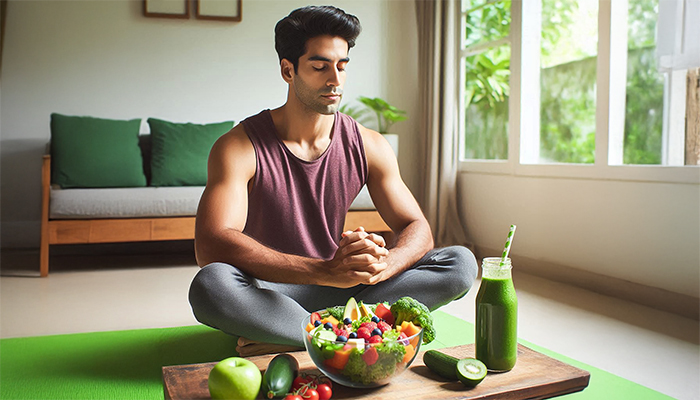Table of Contents
- Key Takeaways
- The Science Behind a Lean Body Diet
- Nutritionist at FITPASS: Riya Mehta’s Point of View: First Meal Matters
- Sample Indian Diet Plan for a Lean and Shredded Body
- Pre-Workout (Nutritionist Ilma Naaz’s View)
- Body Recomposition with Indian Diet
- Personal Experience: Staying Lean with Indian Food
- Conclusion
Achieving a lean and shredded body isn’t only about sweating it out in the gym. What you eat plays an equally crucial role in building lean muscle, reducing fat, and maintaining energy levels. An Indian diet plan for a lean body can be highly effective, thanks to its diversity of whole foods, plant-based proteins, and spices that naturally boost metabolism.
Key Takeaways
- A lean body diet plan in India focuses on balanced nutrition with adequate protein, complex carbs, and healthy fats.
- Both vegetarian and non-vegetarian options can help achieve a shredded body.
- Proper meal timing is as important as the quality of food.
- Pairing fruits with proteins or healthy fats can stabilise energy levels.
- A cutting diet plan in Indian style doesn’t have to be restrictive; it should be sustainable.
The Science Behind a Lean Body Diet

A lean muscle diet plan relies on creating a slight calorie deficit while keeping protein intake high to preserve muscle mass. According to a study published in the Journal of the International Society of Sports Nutrition (2017), individuals consuming higher-protein diets maintained more lean body mass during fat loss compared to those on moderate-protein diets.
This means your diet chart for lean body goals should include enough protein sources, like paneer, lentils, tofu, eggs, or chicken, combined with complex carbs such as oats, brown rice, or quinoa, and healthy fats from nuts and seeds.
Nutritionist at FITPASS: Riya Mehta’s Point of View: First Meal Matters
Fruits like bananas and pineapple are healthy options as they provide quick energy due to natural sugars, vitamins, and fibre. However, consuming only fruit first thing in the morning may cause a rapid energy spike followed by a drop. Riya Mehta suggests pairing fruits with protein or healthy fats, like Greek yoghurt, almonds, or chia seeds, for steady energy and satiety.
This combination works well for anyone on a lean muscle diet plan, male or female, as it ensures a balanced start to the day and prevents unnecessary cravings later.
Sample Indian Diet Plan for a Lean and Shredded Body

Wake-Up Meal
- Warm water with lemon.
- 4 soaked almonds + 2 walnuts.
- 1 banana with a spoonful of peanut butter.
Breakfast
- 2 boiled eggs/tofu scramble.
- 1 multigrain roti or a bowl of oats.
- Green tea or black coffee.
- Mid-Morning Snack.
- Pineapple slices with Greek yoghurt.
- Herbal tea.
Lunch
- 1 cup brown rice or 2 chapatis.
- Grilled chicken breast/paneer bhurji.
- Dal (lentils).
- Salad with cucumber, tomato, and spinach.
Pre-Workout (Nutritionist Ilma Naaz’s View)
An effective pre-workout meal must provide carbs for energy and protein for muscle support. Options include:
- Banana with peanut butter.
- Dates with almonds.
- A granola bar.
Caffeine, through black coffee or green tea, can further enhance focus and endurance.
Post-Workout
- Whey protein shake or soy protein shake (for vegetarians).
- 2 boiled eggs or roasted chana.
Evening Snack
- Roasted makhana or chana.
- Green tea.
Dinner
- Grilled fish/paneer tikka/dal tadka.
- 1-2 multigrain chapatis.
- Stir-fried vegetables.
Before Bed
- A glass of warm turmeric milk or chamomile tea.
Body Recomposition with Indian Diet

If your goal is body recomposition (gaining lean muscle while losing fat), balance is key. Slight calorie cycling, eating a bit more on workout days and a bit less on rest days, can help. A vegetarian diet plan for lean muscle gain may include lentils, soy products, dairy, and quinoa, while non-vegetarians can include chicken, eggs, and fish.
Personal Experience: Staying Lean with Indian Food
When I shifted to a lean bulking diet plan, Indian style, I focused on dal, paneer, eggs, and seasonal vegetables. Instead of fancy supplements, I relied on home-cooked food. Within three months, I noticed visible muscle definition without feeling drained or deprived. Pairing fruits with protein (like pineapple with yoghurt) made a big difference in sustaining energy during long workdays.
This experience proves that a desi workout diet can be both effective and sustainable. For those who find it hard to plan meals, services like FITFEAST make it easier with customised meal plans and expert nutrition guidance.
Conclusion
A lean and shredded body doesn’t require extreme diets. Instead, it’s about choosing the right Indian foods, balancing macros, and sticking to consistent eating habits. Pair that with structured workouts, and you’ll not only lose fat but also build lean muscle that stays.

How can I get shredded in India?
Combine a diet rich in protein, complex carbs, and healthy fats with a consistent strength training regimen. Consult a nutritionist to create a personalised plan that fits your Indian dietary preferences.
How do you lose 5 kg in 15 days?
Aim for a moderate calorie deficit, increase physical activity, and focus on nutrient-dense whole foods. Crash diets are unsustainable - a gradual, balanced approach is more effective for lasting results.
How do I get a ripped diet plan?
Work with a qualified nutritionist to develop a diet plan that optimises your macronutrient intake for muscle growth and fat loss. Consistency and patience are crucial to achieving a ripped physique.
How to lose 5kg in 7 days diet plan?
Extreme short-term weight loss is not recommended, as it is often unsustainable and can be unhealthy. Aim for a gradual, sustainable approach of 0.5-1 kg per week through a balanced diet and regular exercise.
Can I lose 5kg in 21 days?
A weight loss of 5kg in 21 days is possible, but it would require a significant calorie deficit and extensive exercise, which may not be sustainable long-term. A more realistic and healthy target is 0.5-1 kg per week.
Can I lose 2 kg in a week?
Losing 2 kg (4.4 lbs) in a week is possible with a calorie deficit and increased physical activity, but it may be challenging to maintain and could lead to muscle loss. A more sustainable target is 0.5-1 kg per week.
Is 2 kg weight loss noticeable?
A 2 kg weight loss can be noticeable, especially if you carry a lower body weight. However, the visibility of weight loss can vary depending on factors like body composition, height, and muscle-to-fat ratio.
How to get lean diet?
A lean diet includes lean proteins, whole grains, fruits, vegetables, and healthy fats. Avoid processed foods, sugars, and high-fat items. Focus on portion control, balanced nutrition, and regular meals.


